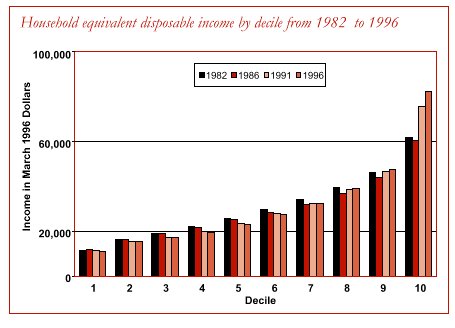
-
Treasury
- SOCIAL COHESION AND INCLUSION
Treasury Secretary Alan Bollard says that the goal of closing the gaps between Maori and non-Maori is the hardest challenge for economic and social policy. Speaking to a news conference on Treasury's briefing papers for the incoming Government, Dr Bollard says that disparities are being increased by the trend to global competition and by higher pay for the better skilled and educated. Treasury considers that protecting the living standards of those families who are the most disadvantaged " is a prerequisite to achieving social cohesion".The briefing paper, entitled "Towards Higher Living Standards For New Zealanders", includes extensive analysis of the need for social cohesion and discusses the problems of adequacy of incomes for the retired and the poor. Treasury: "Whilst income measures suggest that living standards have generally been protected, this may not be the case for everyone. We suggest the adequacy of living standards for low-income people in different circumstances needs further attention..."
Media commentators have observed that the Treasury advice represents a significant departure from recent briefings. An unnamed Labour government "insider" remarked to the New Zealand Herald: "The Treasury has discovered poverty."
- Dr Bollard told the news conference that income disparity was complex. His examples:
—although there was evidence the top 10% had had gains in income, it was not always the same people in that top group.
— the spread between high and low incomes had widened since the 1980s, but much less so in the 1990s.
— some low-income families might have lower post-housing incomes in 1996 than comparable families in 1982.Treasury: "Increasing income inequality itself does not necessarily create a problem for social cohesion if people regard the distribution of incomes as fair. To the extent that income is seen as a just reward for talent, time invested in education or extra hours at work, it will not threaten cohesion. However, cohesion may be reduced if inequalities are perceived to be excessive or unfairly generated. And there may be consequences for other social outcomes if socioeconomic disparities widen ..."
Click here for graph showing average regional unemployement rates
- INCREASING SKILLS AND PARTICIPATION
Treasury predicts that retraining, skill updates and frequent changes in jobs will increasingly be a feature of NZ'ers working lives. It recommends that a wide variety of training options across a whole spectrum of skills be developed to meet the future demand.Treasury: "We know that skills are a key determinant of individuals' incomes and living standards. Ultimately it is the way we apply our skills our creativity, our technical knowledge, our social skills, ability to make decisions, manage and market that will influence our incomes and quality of life.
"We know that, in developed countries, the era of low skilled workers earning relatively high incomes has passed. For most people, income levels are tied to participation in the labour market and this participation is one of the main ways people maintain and upgrade their skills. We know that higher incomes generally come from higher productivity. We also know that, at least to some extent, skills acquired at school are linked to productivity in jobs.
"No policy maker, though, can promise that particular skills or more skills will generate higher levels of growth which makes designing programmes that enhance skills development without competing with or detracting from other goals particularly challenging."
- The briefing papers also point out that NZ faces the challenge of a growing
demographic bulge from "historically lower achieving groups".
Treasury: "A disproportionate number of Maori and Pacific Islanders leave schools without qualifications and work in low skill jobs. Over the next two decades, Maori and Pacific Islanders will increasingly form a larger proportion of the working age population. Their continued low achievement may prove a constraint on growth..."
- FURTHER TREASURY OBSERVATIONS
Other points in the Treasury papers:
— The government has inherited an economy poised for moderate long-term growth and on the upswing of a business cycle. The challenge is to strengthen this growth path.
— pressing matters for the incoming government: relationships between the Crown and Maori, and retirement incomes policy.
—in the face of high current account deficits, the government might need to run higher surpluses than forecast in the pre-election update.
— the "extended and persistent tail of underachievement" among school leavers was a concern.
— increasing globalisation and the growing mobility of populations are likely to see New Zealand more closely integrated with the Australian economy.
— a downside to this greater integration could be NZ firms moving across the Tasman to take advantage of a larger market and economies of scale.
Sources Treasury Briefing To The Incoming Government 1999 "Towards Higher Living Standards for New Zealanders", available on the internet;
New Zealand Herald 22 December 1999 "Closing social gaps `hardest challenge'" by Vernon Small.
The full version of this Briefing Paper to the Incoming Minister is available to the public on the internet.
type Acrobat (.pdf) file
internet link: http://www.treasury.govt.nz/pubs/bmb/brief99/higherliving.pdf

Top of Page
This Letter's Main Page
Stats | Subscribe | Index |
The Jobs Letter Home Page | The Website Home Page
jrt@jobsletter.org.nz
The Jobs Research Trust -- a not-for-profit Charitable Trust
constituted in 1994
We publish The Jobs Letter
— from the briefing papers
from The Jobs Letter No.115 / 17 January 2000







